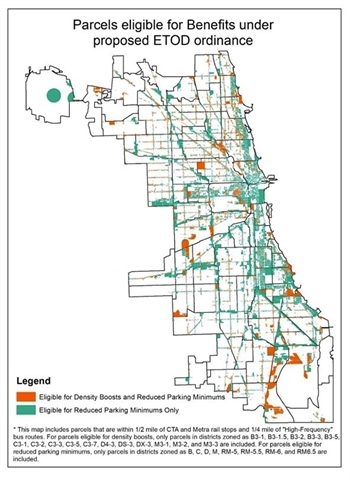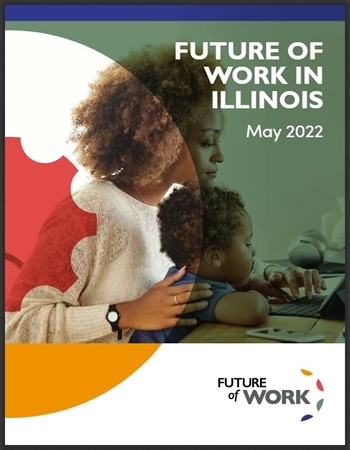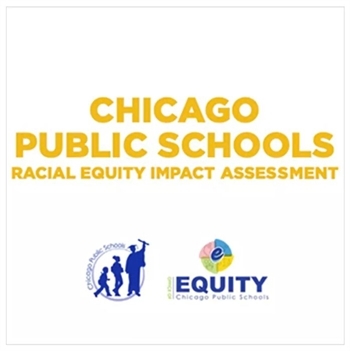Our Equitable Future Retrospective
In 2017, MPC released The Cost of Segregation, a landmark study quantifying the impacts that decades of racist policies and practices have had on our region’s people and built environment. In the wake of these findings, MPC brought together a diverse group of stakeholders to develop a comprehensive agenda around economic development, housing, education, and criminal justice. We called this collaborative effort Our Equitable Future (OEF).
It’s been five years since the release of OEF, and much has happened in that timeframe. In light of significant shifts accelerated by COVID-19 and a refocusing on racial justice, MPC is looking back to see what has been accomplished, what learnings we can take from these recommendations, and how we should look to the future to build a more equitable region.
Overview of Our Equitable Future Process & Current Engagement
Following The Cost of Segregation, MPC convened 100 advisors to develop 25 actionable policies at the city, county, region, and state levels. A report was developed and created, titled Our Equitable Future: A Roadmap for the Chicago Region (OEF). The menu below outlines the categories and recommendations included in OEF.
- Establish a graduated real estate transfer tax
- Prioritize economic growth that creates opportunities for everyone
- Invest equitably across the region
- Make vacant lands an asset
- Improve health through publicly funded development
- Use equity as a key measure for transportation planning efforts
- Help local governments build capacity needed to thrive
- Develop employer leadership to grow a pipeline of young skilled workers
- Build wealth early through amtched child savings accounts
- Adopt a City Earned Income Tax Credit
- Make jobs accessible to low-income residents
- Establish a fairer way to pay for transit
- Conduct a regional assessment of fair housing
- Assess the impact of new and proposed development
- Property tax relief for affordable units across a range of neighborhoods
- Increase housing options by increasing CHS voucher subsidies
- Reform unfair, inaccurate Cook County property tax assessments
- Expand homeownership opportunities
- Ensure affordable units are leased to those most in need
- State-level education funding changes
- Create strong schools across Chicago neighborhoods
- Identify opportunities for racial and economic integration by merging geographically proximate schools
- Reform police training to reduce excessive force and racial profiling
- Break the link between people with low incomes and incarceration
To better understand how OEF recommendations have advanced and how the policy environment has evolved, MPC engaged original advisors and other stakeholders through 60 surveys and 11 in-person interviews, with our learnings detailed below.
This page will evolve over time with additional insights around implementation challenges and deeper analysis of how recommendations have advanced.
Equity Themes
As our region recovers from the multifaceted impacts of COVID and engages with renewed focus on racial justice, equity considerations in policy must be central. Through engagement, four equity themes emerged around the Our Equitable Future recommendations:
Equity cannot be a silo.
Equity cannot be confined to a single role or area, it must be integrated across public, private and civic sector institutions. While dedicated staff and resources are needed to lead this work, to truly realize meaningful change there must be an organizational commitment to equity as both a process and an outcome.
Narrative change is not a substitute for action.
Conversations around equity have moved faster than implementation. There needs to be greater emphasis on development and implementation strategies that reduce racial inequities and support the culture change that make DEI values actionable.
Entrenched interests are slow to shift.
Operationalizing equity disrupts traditional hierarchies and requires sharing and shifting power. Institutions that steward wealth and economic interests have been slow to change the ways they distribute resources.
We rise as a region.
Progress across the region has been highly uneven. Competing interests between jurisdictions and a lack of shared goals and clear targets diminishes large-scale change.
Issue Area Themes
Of the 25 recommendations in Our Equitable Future, 20 have seen some movement towards adoption or have been implemented at some level of government. Below, we assess what we learned from surveys and interviews, noting policy victories and highlighting persistent challenges.
Policy Spotlight: Connected Communities Ordinance
Transit-oriented development, a suite of policies which create more favorable real estate development conditions in proximity to transit, is a foundational tool to both drive investment and support affordable neighborhoods. Roughly a decade after Chicago first implemented a TOD policy, the Connected Communities Ordinance centralized equity considerations by ensuring the South and West sides can also develop vibrant neighborhood hubs around transit.

As a founding member of Elevated Chicago, MPC both shaped The Connected Communities Ordinance and completed an impact assessment and advocacy work, expanded the eligibility radius around transit stations and included high frequency bus routes, further reduced parking requirements, and allows additional density for affordable units. Overall, these changes expanded the area of the city eligible for parking and density bonuses by 1,000%, covering 29% of the city’s developable area. For the top 20 communities that will see increases in eligible areas, 11 are majority BIPOC on the South and West Sides. These changes will drive investment across the city, supporting vibrant, mixed-use neighborhoods.
“Summary of City of Chicago’s 2022 Proposed Changes to the TOD Ordinance”, Metropolitan Planning Council, 2022.
Challenges
Across the seven recommendations for Targeting Economic Development and Inclusive Growth, engagement identified several key challenges, including a lack of shared metrics, insufficient financial commitments to programs, and a complex environment for development. In terms of metrics, there are no shared, regional benchmarks to assess whether economic development strategies are moving the needle, particularly in under-invested communities. The region is benefitting from a deluge of resources from the American Rescue Plan (ARPA) and the Coronavirus Aid, Relief, and Economic Security Act (CARES) the Bipartisan Infrastructure Law, and the Inflation Reduction Act. However, this large amount of funding has led to a great number of small pilot programs without long-term resources. While pilot programs are critical for testing efficacy and building towards meaningful scale, they do not create a consistent ecosystem of economic development incentives providing stability and certainty. Finally, participants noted development in the city can be difficult due to complex zoning and land use practices, which MPC is currently convening stakeholders around to develop a comprehensive assessment.
Policy Spotlight: Chicago Blueprint for Fair Housing

In response to the 2021 Affirmatively Furthering Fair Housing regulation (which was rescinded but is currently going through rulemaking to be reinstated), and the OEF recommendation to regionally assess fair housing, housing stakeholders in the region partnered to understand and identify solutions for segregation in housing. The Blueprint identified that of the 1.8 million Chicagoans of color, 74% lived in economically disconnected areas. An advisory group, convened by the Chicago Area Fair Housing Alliance and supported by MPC, completed extensive data analysis in concert with community conversations to understand equity implications. This centered around a self-reinforcing cycle of segregation which creates racially concentrated areas of poverty and low economic opportunity, disparities in community assets including education and transportation, and environmental racism and resulting health impacts. The assessment identified eight goals to advance more integrated and affordable housing across the city.
Challenges
During engagement, respondents noted that local prerogative over affordable housing, varying rules by jurisdiction, and inadequate federal funding are challenges to long term, regional affordability. While an executive order was passed in 2019 eliminating the requirement for a letter of aldermanic support in Chicago for affordable housing projects, in addition to further incentives for affordability in the Connected Communities ordinance, there is substantial local prerogative throughout the region, which diminishes affordable developments in the suburbs. This, along with a lack of standardized land use and affordable housing practices across the region and state, contribute to a fragmented environment for development which does not guarantee affordability in every community. Finally, many housing programs rely on federal funding which is inadequate to make the significant investments required for integrated, affordable communities.
Policy Spotlight: Future of Work Task Force Report

Legislation passed in 2021 created the Future of Work Task Force to understand Illinois’ labor market and its challenges and opportunities. Following an eight-month convening, with MPC as an academic partner, the Task Force of public, private, and non-profit partners published a report which defined job quality, accounted for the impacts of new technology, and advanced sector-specific solutions to workforce challenges. Major challenges identified in the report include racial and economic inequities in COVID recovery, the bifurcation of the labor market into high-wage and low-wage jobs with a missing middle, and racial disparities in access to education and training. Opportunities include leveraging growth sectors like healthcare, leading nationally on aligning business and worker needs, and the state’s commitment to growing our economy through equity and clean energy investment. The report identified 58 unique recommendations for industry, the State, and the workforce system at large to advance high-quality employment for all residents.
Challenges
Across the recommendations, engagement reflects a perception that 1) the private sector has not kept pace with the public sector in terms of relevant commitments, 2) there are foundational plans and resources, but they haven’t produced large, tangible wins, and 3) there is a lack of accountability around spending in a time of historic resource availability. While a number of private sector initiatives have emerged locally to expand access to good jobs for all residents, there is a sense that these have not scaled to match the seriousness of underlying inequities. Tracking these efforts is complicated by a lack of regional metrics and coordination around economic development. There has been a wave of resources in the form of COVID recovery funds, infrastructure, and climate change related spending that has been matched at the State and Local level. However, there have not been significant wins for these resources in terms of long-term job creation. Finally, with this substantial influx of resources, there are concerns around transparency and accountability of spending across all levels of government.
Policy Spotlight: Chicago Public Schools Racial Equity Impact Assessment Framework

Following the launch of Chicago Public Schools Office of Equity in 2018, the Office has engaged a variety of stakeholders to develop knowledge, policies, and tools to create a more equitable education system. Aligned with the “equity in all policies” recommendation of Our Equitable Future, CPS released a Racial Equity Impact Assessment (REIA) framework in 2022. The framework provides background on REIA’s, pre-assessment considerations, concrete steps to complete the assessment, and examples of possible uses. While CPS does not disclose how REIA’s have been leveraged in all processes, engagement for the retrospective indicated that CPS has begun to incorporate these more meaningfully in decision making processes, particularly around distribution of resources. MPC has advocated REIA’s and HREIA’s (incorporating health impacts) in projects including Chicago’s Qualified Allocation Process and the We Will citywide plan.
Challenges
The education field was particularly upended by the onset of COVID-19, exacerbating decades-long inequities in resources and educational outcomes. Although the state passed a modified education funding formula just prior to the release of Our Equitable Future, the statutory requirement is to fully fund this allocation model by 2027. The state has increased annual education funding by $1.6B over the past five years, with 99% going to historically underfunded districts, but 70% of districts statewide remain underfunded in some capacity. The challenge of equitable funding is complicated by differences in tax bases between municipalities. Jurisdictions with substantial resource bases are not as dependent on the state and can make deeper and longer-term investments in education and complementary services untethered from budgetary negotiations in Springfield. Finally, engagement indicated challenges around communicating the necessity of centering equity in education. COVID-19 has created a myriad of problems in education, and it can be challenging to engage families with systemic privileges in ensuring that resources are distributed to those who need them most.
Policy Spotlight: SAFE-T Act
Passed in 2021, the Safety, Accountability, Fairness and Equity-Today Act (SAFE-T) advanced extensive reforms around the policing, pre-trial, and corrections components of the criminal justice system. In alignment with the recommendations of Our Equitable Future to reform police training to reduce excessive force and racial profiling, SAFE-T creates new standards around police force, prohibits access to military equipment, expands body camera use, and increases reporting requirements. Breaking the link between people with low incomes and incarceration, Illinois led the nation through passage of the Pre-Trial Fairness Act, which abolished cash bail, created an oversight board to oversee data collection and analysis, revamped pretrial release procedures, and added notification of pretrial hearings for victims of crime. The multitude of reforms included in the SAFE-T will address the harms that the criminal justice system imparts, particularly on communities of color, and its pre-trial reforms will ensure that individuals across the state are not incarcerated solely for being low income.

Challenges
Crime and perceptions of crime have experienced unique challenges since the onset of COVID-19, with phenomena including carjackings and organized retail theft prominent in collective anxieties. These emerging activities have prompted many to return to “tough on crime” policing strategies which have outsized impact on communities of color and low-income communities. To help counter this shift, stakeholders indicated a need for public education around both the actual realities of crime and its distribution as well as what the SAFE-T Act does and does not do, given misinformation around increases in crime being tied to the SAFE-T act and changes in pre-trial detention. This layering of new public safety challenges and the need for greater public education has made the work of reform more complex, as demonstrated by significant challenges to the elimination of cash bail. Another tension emerges between reforming an existing justice system of deep harms and building wholly new, truly reparative structures. While practices may impart less harm through iterative changes, foundational components of the criminal justice system are informed by a racism that is unlikely to be “reformed away”. Stakeholders also noted the challenges presented by stubbornly positive perceptions of prisons among certain groups, such as prisons as economic opportunities for communities with a smaller economic base, and as a place where union labor plays a key role. Additionally,
Cross Sectional Themes
Equity cannot be a silo.
Equity cannot be confined to a single role or area, it must be integrated across public, private and civic sector institutions. While dedicated staff and resources are needed to lead this work, to truly realize meaningful change there must be an organizational commitment to equity as both a process and an outcome. Organizations may place responsibility for equity considerations in a single department or role, which may suffice for project management but will not ensure that reparative actions are central to the function of the whole. A policy response to this is the Mayor’s Office of Equity and Racial Justice, which was codified by Chicago ordinance in 2022. This both created a permanent structure which will advance equity concerns in city government, while also codifying specific processes across all departments. This includes required citywide plans for mitigating equity issues, departmental racial equity action plans, research and data collection, and budgetary review. This approach ensures that equity considerations are central to all governmental operations and are embedded in significant processes.
Narrative change is not a substitute for action.
Conversations around equity have moved faster than implementation. There needs to be greater emphasis on development and implementation strategies that reduce racial inequities and support the culture change that make DEI values actionable. Participants noted that there are significant resources for foundational equity education, but not for operationalizing structural equity. There is a need for greater resource development that will allow public, private, and civic sector employees to identify unique equity considerations in their specific line of work, and how to build solutions to address these.
Entrenched interests are slow to shift.
Operationalizing equity disrupts traditional hierarchies and requires sharing and shifting power. Institutions that steward wealth and economic interests have been slow to change the ways they distribute resources. There is long-standing precedent and awareness of racist practices in mortgage lending across the Chicago region. Even with continued commitments towards equity from the private sector, disparities remain. An Urban Institute study in 2022 identified that, while Black families comprise 22% of homeowners in Chicago, they account for only 14.5% of mortgage lending. The need for transformative and effective practices is clear; an incremental approach will only produce incremental progress.
We rise as a region.
Progress across the region has been highly uneven. Competing interests between jurisdictions, a lack of shared goals and clear targets diminishes large-scale change. Affordability concerns and transportation access issues are not subject to the boundaries of a single jurisdiction, and alignment across all layers of government and the private sector is critical. One example is the Blueprint for Fair Housing, which was originally a regional initiative but became focused on just Chicago due to challenges in engaging suburban partners, whose interests are different than those of the city. As a result, while regional housing challenges were assessed, only the City of Chicago codified policies to counteract segregation.
Call to Action
The vision of Our Equitable Future is a more vibrant and equitable region where every community has what it needs to thrive. The OEF recommendations we made 5 years ago have served as a starting point for that vision, which has seen significant movement towards implementation. Now public, private, and civic stakeholders across our region need to come together to establish clear, actionable targets and shared measurements for progress. We need to define what success and accountability look like as we work to move the needle across sectors. For MPC, and for all our partners, the next step is reaching across jurisdictional borders to build a comprehensive framework a better future — together.
